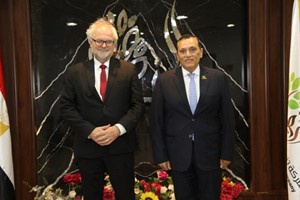In Uganda, UNICEF and the Government have joined forces in an ambitious effort to eradicate hunger and improve nutrition through integration into the country’s health and essential medicine systems. This collaborative initiative aims to enhance maternal, newborn, and child survival and development by addressing undernutrition—a critical issue affecting millions in the nation.
Ayako Okamura, a UN Volunteer Nutrition Supply Chain Officer, has been pivotal in this endeavor. Working closely with the Ministry of Health, Ayako has focused on incorporating nutrition supplies into the national health system, aiming to improve the delivery and management of these essential resources.
Undernutrition in Uganda is a significant contributor to poor health outcomes, particularly among mothers and children. Stunting (low height for age) and wasting (low weight for height) are prevalent indicators of childhood malnutrition, stemming from chronic or recurrent undernutrition. These conditions are often linked to poverty, inadequate maternal health and nutrition, and improper feeding practices in early childhood, all of which hinder children from achieving their full physical and cognitive potential.
Despite some progress, with the prevalence of stunting decreasing from 33% to 29% between 2011 and 2016, an estimated 1.8 million children in Uganda remain stunted. The prevalence of wasting has shown only a slight decline, from 5% to 4%, with higher rates in regions experiencing emergencies or chronic drought.
To address these challenges, UNICEF is strengthening systems at both national and district levels. The organization provides the Ugandan government with essential support, including the procurement of nutrition supplies such as therapeutic treatments for severe acute malnutrition, Vitamin A supplements, deworming tablets, iron and folic acid, and anthropometric equipment.
Since April 2018, Ayako Okamura has been instrumental in these efforts. Serving through the Global Human Resource Development Programme for Peacebuilding and Development (HRD) of the Government of Japan, Ayako has supported the Ministry of Health in integrating and optimizing nutrition supply chains.
"Most nutrition supplies in the country are managed through UNICEF parallel supply chains, where goods are procured, stored, and distributed by UNICEF to focus districts and regional referral hospitals," Ayako explained. "Conversely, there is a national supply chain system for essential medicines and health supplies managed by National Medical Stores (NMS)."
Ayako’s role involved extensive collaboration with the Ministry of Health’s Nutrition Division, the Pharmacy Department, and the NMS to integrate nutrition supply chains. In the field, she worked with District Health Offices and health facility staff to ensure effective supply chain management for nutrition programs at various operational levels.
"The integration process is not only about handing over supplies and logistics functions to NMS but also about greater integration of nutrition supplies in the national health system," Ayako elaborated.
During her assignment, a significant number of children—65,379—were admitted to the treatment program for severe acute malnutrition, underscoring the continuing need for such interventions.
Ayako’s experience in supply chain management in the private sector provided a strong foundation for enhancing public health supply chain management within the UN system. She emphasized the goal of increasing national ownership and sustainability of nutrition programs by transitioning control of nutrition supplies from UNICEF and other partners to the national supply chain mechanism.
"The full integration of nutrition supplies will take time and will require long-term government budget allocation to nutrition supplies, dependent on government priorities," Ayako noted.
This collaborative effort between UNICEF and the Ugandan government represents a critical step towards addressing malnutrition and improving the health and development outcomes for Uganda’s children, promising a healthier future for the nation.
Author: Ayako Okamura
By: Ayako Okamura











